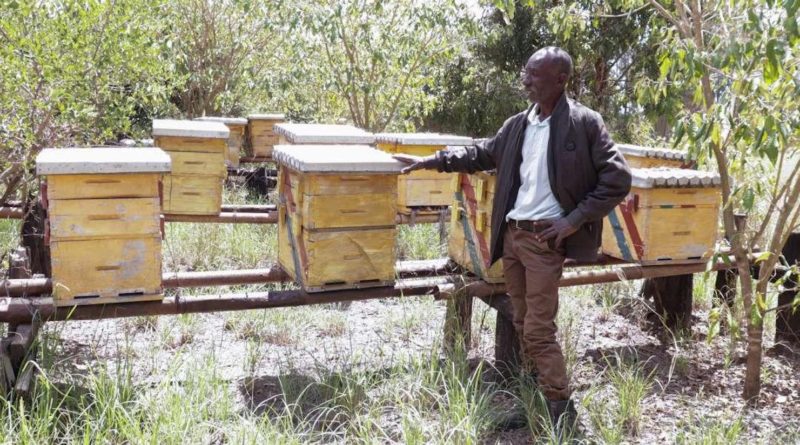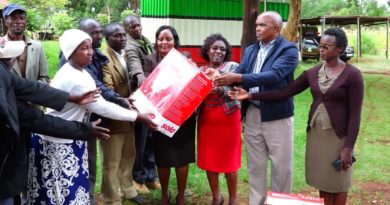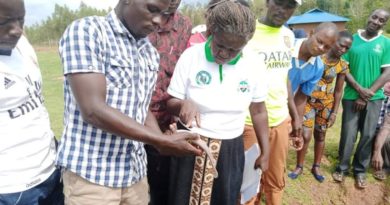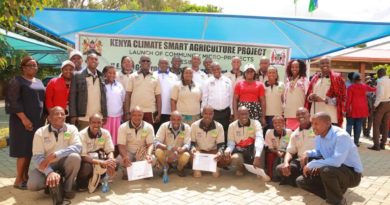Commercializing Rukuri, The Traditional Meat Delicacy
From laikipia.go.ke
Long before Europeans came to colonize them, many African communities had their technology that ranged from tool-making to medicine as well as food preservation.
Many communities had ironsmiths who fashioned out tools and weapons such as spears, dagger, and arrows.
Where did such indigenous technologies go? The County Government of Laikipia has been holding indigenous technology fairs in Rumuruti aiming to have some of them commercialized.
One man took the cue from the last Laikipia Indigenous technology fair held in December 2019 by commercializing a packed meat which is preserved using a traditional method as done by Gikuyu and several other communities.
In many cultures, honey was used to preserve meat. This was known as rukuri. It is an indigenous technology which was effective in ensuring preserved meat could last for a very long time.
Among the Gikuyus, rukuri was a delicacy preserved and packaged in aged honey that enabled it to remain the same way for a very long time even extending to years.
How does the honey work, therefore? The honey preserves the meat by drawing out moisture. This traditional way of preserving meat out stages the modern refrigerators with longevity. But with preservatives and refrigerators, this valuable technology has been forgotten.
One man though remains attached and is using it to make a living. Eustace Muturi, a businessman sells honey and rukuri in Nanyuki town.
Muturi is a beekeeper with more than 100 beehives in a three-acre farm where he harvests honey both for sale and for preparing this traditional dish for his customers. The commercialization of this venture has enabled him to sustain his family. We sort to understand this rukuri better, and Mr. Muturi gave us an in-depth recipe to this old technology.
In order to make a good rukuri, ensure the meat is dry either by drying or roasting it.
This is because when honey comes into contact with water, it ferments to form alcohol. For meat preservation, one does not need this, but for traditional Kikuyu brew “Muratina” well, it is very essential.
Exhibited
Then boil the meat before dipping it into honey. Ensure that the honey is free from contamination. This can be confirmed by looking keenly for the thin layer that should be covering it.
In the early days, Kikuyu men had many cattle which meant a large quantity of meat when slaughtered. They had to find a way of preserving the meat as they used to have other ways of preserving other products such as maize. Since honey was in abundance, they used it
adds Muturi.
He advises anybody wishing to use honey to preserve meat to make sure it’s from a reliable source.
Muturi exhibited rukuri at the indigenous technology fair organized by the Government. The fair was organized with the objective of job and wealth creation by tapping available indigenous technology.
The preparation of the Rukuri is part of the whole process of bee farming to Muturi. Having been a bee-keeper for 33 years, he prides himself on having extensive knowledge of insects.
Here, he has planted indigenous trees to help in the pollination process as they need adequate flowering trees.
His work has enabled him to interact with other individuals interested in the business which he says will help to create employment among people.
I have trained more than 120 people with the expectation that they will go out, keep bees and create jobs for others
Muturi says.
From over 100 beehives he produces about one tonne of honey per year making his business afloat. The father of three sees this sector as very lucrative but requires much patience to succeed.
Greatest moment
When he got a chance to address H.E. President Uhuru Kenyatta during a tree planting program at Michinda Primary, Nyahururu in 2013.
I was approached by Kenya Forest Service to represent farmers and explain to the president about beekeeping, a story of 30 years’ experience I was to tell in two minutes
he recalls.
After finishing, the president was impressed and requested him to explain more on the same, it was a great moment.




